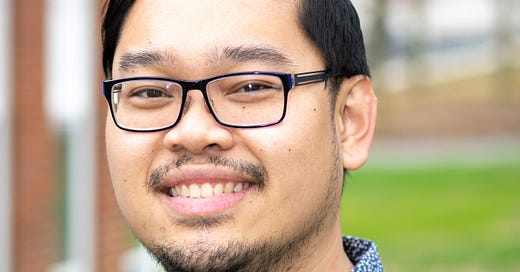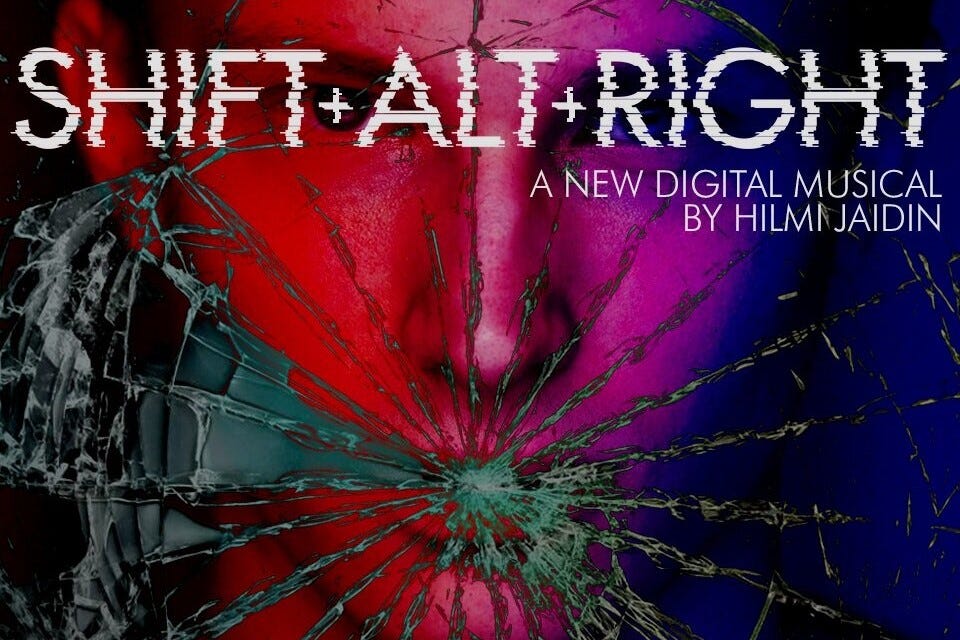Hilmi Jaidin makes modern musicals entirely online.
His first in-person show at Vault Festival in March might also be his last.
Hello, and welcome to The Crush Bar, a weekly newsletter about theatre written by me, Fergus Morgan.
Each issue features an interview with an exciting, emerging theatremaker - and gives them a chance to be explicit about where they want to go and what help they need to get there. Maybe you, reader, can give it to them, or put them in touch with someone who can.
You can read more about why I’m doing this here, and you can sign-up to get it delivered straight to your inbox using the button below…
Musical-writer Hilmi Jaidin has a show on at Vault Festival in March next year. It will be his first in-person production – and he has a funny feeling it might also be his last.
“I think the future is digital,” Jaidin says. “There is still so much to explore in the digital space, and that really excites me. It is almost impossible to make a living as a writer of new musicals in this industry with traditional stagings because they cost thousands of pounds and come with enormous financial risk. With digital musicals, though, it is different. With digital musicals, there is some hope.”
Jaidin has already done some exploring in the digital world. Last October, his first hour-long musical Shift+Alt+Right premiered. Produced and directed by Adam Lenson, it starred Max Alexander-Taylor as a gamer seduced by an alt-right activist, and was created to be staged, streamed and watched entirely online via webcams and live-streams.
“Of course, it was a response to the pandemic, and to the fact that no-one could make in-person work last year,” says Jaidin. “Adam runs a series of showcases of new musical theatre writing, and he moved them online at the beginning of lockdown. I thought: ‘Well, if you can perform one song live online, you can perform a whole musical live online, too.’ Adam loved the idea, and I wrote the whole thing in four months.”
Dramatically and musically, says Jaidin, Shift+Alt+Right typifies the work he wants to make – formally experimental, musically adventurous, slightly satirical and seriously dark. The kind of work, in other words, that is given scant support in Britain, and which is rarely given the resources it needs to thrive.
“To say I am cynical about the state of new musical theatre in the UK is an understatement,” says Jaidin. “People talk about ‘British musicals’ as if they are a thing, but they just mean Andrew Lloyd Webber and Les Mis. ‘British musicals’ have never been a thing, not since the 1980s. Musicals have never been allowed to evolve and grow in this country like they have in America. There just isn’t the same support.”
“My hope is that digital musicals can help change that culture,” Jaidin continues. “Anyone can write a digital musical. Anyone can stage a digital musical. And anyone, anywhere in the world, can watch a digital musical. If we can build and access an audience for new digitals online, then maybe we can trigger a shift in the wider industry.”
“Digital musicals are cheaper, much more accessible, and they offer a platform for genuine experimentation…”
Born in 1985, Hilmi Jaidin grew up in South-East Asia, but does not specify exactly where. “I’m a bit cagey about that because free speech is not allowed there,” he says, “but it is in the Singapore-Malaysia-Indonesia-Brunei part of the world.”
“Theatre was just not a thing in my childhood,” Jaidin continues. “The only musicals I saw were Disney films. I didn’t learn music, either, because piano lessons were in the afternoon when I had to go to religious school. My mum did buy me a tiny toy piano, though, with two octaves. I learned Beethoven’s Moonlight Sonata, plus a lot of Abba and Scott Joplin.”
Jaidin moved to the UK at seventeen, on a government scholarship to study law, and it was then that he started to seriously get into musical theatre and to teach himself the piano properly. He never considered pursuing theatre professionally, though, and spent the next fifteen years working in university administration, writing songs in his spare time and occasionally sending them to friends, but no further.
It was when he turned 30 and had a “third-life crisis” that he started posting his stuff on an online forum. The positive responses he got persuaded him to send some songs to Lenson when he issued a callout for contributions to a Southwark Playhouse showcase in 2019 – the same event that saw the first footsteps of Public Domain, the Francesca Forristal and Jordan Paul Clarke musical that made it to the West End earlier this year.
“I wrote a dark, satirical song about the Hong Kong protests, to be sung from the perspective of Carrie Lam,” Jaidin remembers. “It was the first time one of my songs had been sung by a professional singer in a room with a live audience. Hearing their applause was the most euphoric moment of my life.”
The conversations Jaidin subsequently had with Lenson led to another song – a jaunty one entitled Our Unnamed South-East Asian Country – that eventually became the opening number to an hour-long musical called Cruel, Inhuman and Degrading.
“Adam told me to just write what I wanted to write and screw everything else, so I did,” Jaidin says. “I wanted to write about growing up in South-East Asia, in a country where free speech is censored. I wanted the whole show to revolve around censorship. I wanted the name of the country to be bleeped out. I wanted the main character to have memories missing. I wanted to write about living somewhere you cannot be your full, authentic self. It’s a fictional story, but it is heavily inspired by my experiences.”
Cruel, Inhuman and Degrading will run at Vault Festival in March. For now, Jaidin is busy balancing his time between working in university administration – he lives with his partner in Hove and works at the University of Sussex – and developing his musical theatre craft. He is happy that he is finally getting his in-person production next year – even if it is also his last.
“Never say never, but I am far more excited about making digital musicals after this,” he says. “They are much cheaper to make, they are much more accessible, and they offer a platform for genuine experimentation. The possibilities are endless.”
What do you want to do?
I want to write musicals that tell modern stories. Musical theatre always seems to be stuck in the past, but I want to write things that are about the time we are living in now.
You can’t do that with traditional musical theatre, though, because traditional musical theatre has to be timeless because it relies on revivals to make money. Digital theatre doesn’t. Digital theatre is faster and freer. That is its beauty.
What support do you need to get there?
It’s funny, because you don’t really need any help to make digital theatre. You can kind of do it yourself.
What I would really love to see, though, is theatres with a lot of resources – not just money, but connections and contacts, too – throwing their support behind digital theatre, and telling people that it is a valid artform. That would be amazing.
How can people find out more about you?
I’m on Twitter and YouTube – there’s a lot of stuff on there – and there is a Shift+Alt+Right cast recording available on Spotify, too. And people should come see Cruel, Inhuman and Degrading when it is at Vault Festival next year.
The Crush Bar is totally free and unfunded at present, so anything you can do to support it is hugely appreciated. There are three helpful things in particular: you can subscribe using the button above, you can share it, either on social media or by forwarding it to anyone who might be interested, and you can donate to my Ko-Fi account using the button below.
If you want to get in touch with me to ask about anything, or to suggest someone who deserves a shout-out in this newsletter, you can reach me on Twitter - I’m @FergusMorgan - or by simply replying to this email. That’s all for now. Back in a week. Thanks for reading.
Fergus Morgan




